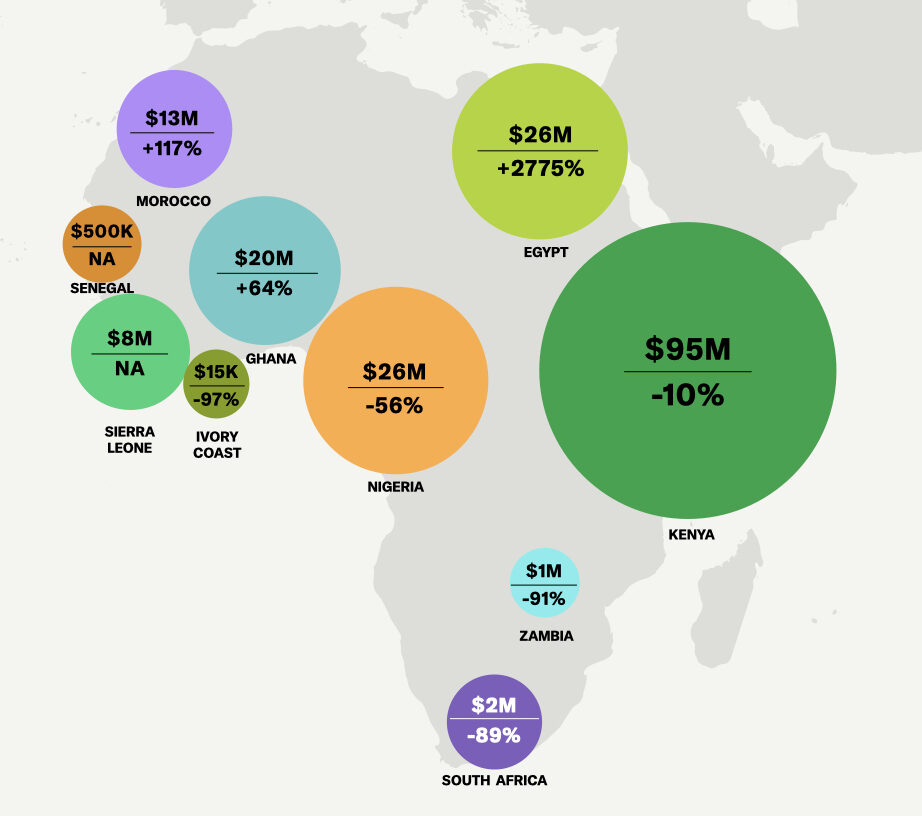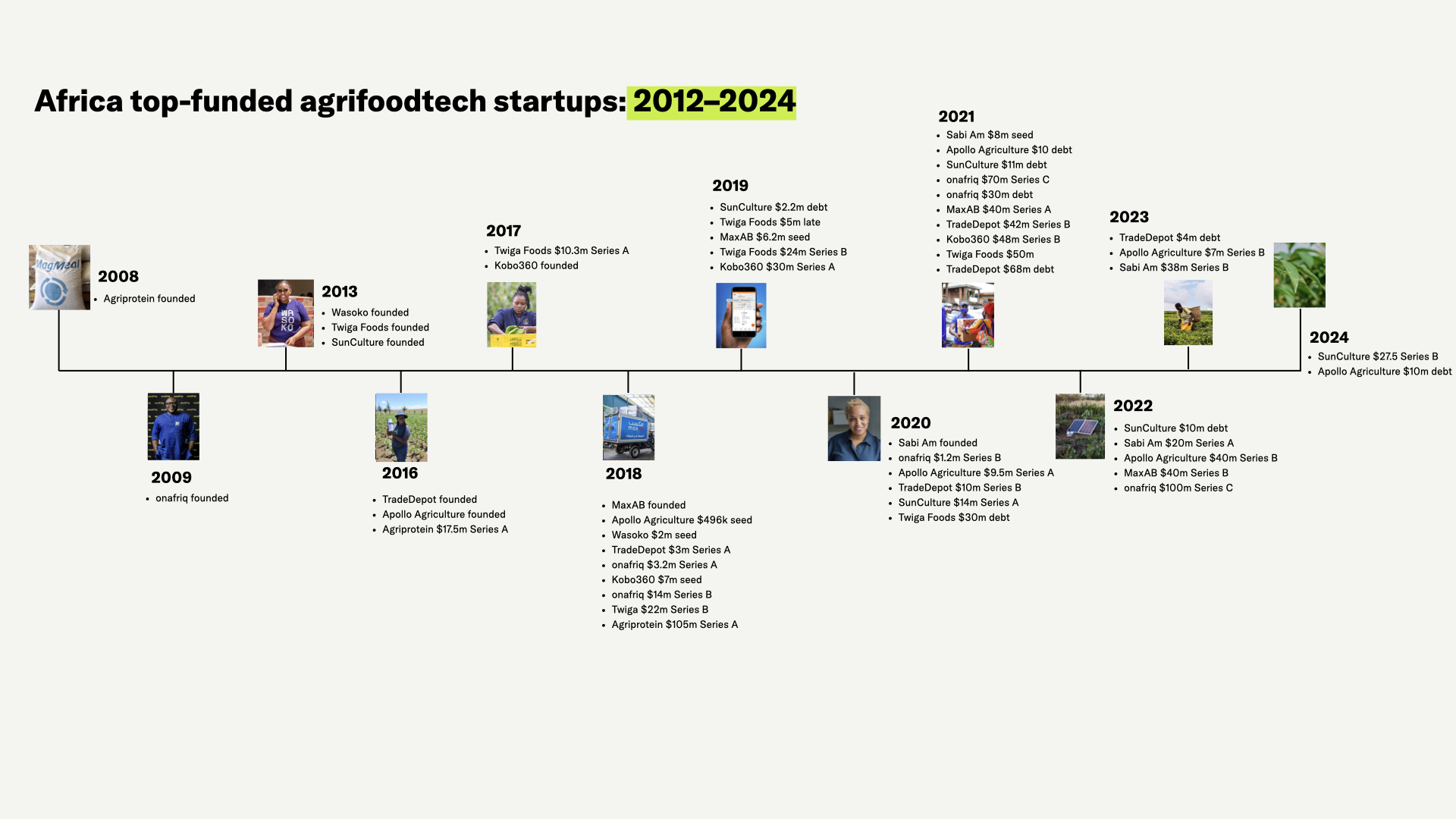[Disclosure: AgFunderNews’ parent company is AgFunder.]
Agrifoodtech Startups in Africa: A 2024 Overview
As we delve into the landscape of agrifoodtech in Africa for 2024, several prominent players emerge, including SunCulture, Apollo Agriculture, Tomato Jos, and Pula Advisors. These companies not only continue to be dominant in the funding arena, but many are also familiar names from 2023’s fundraising activities, alongside others like Hello Tractor and Twiga Foods.
“If you look at the list of companies that have raised the most funds, it would have been mostly the same list two years ago, three years ago,” remarks Maurice Scheepens, who heads the ventures program for agritech at the Dutch entrepreneurial development bank FMO.
The majority of these startups are rooted in Kenya, Egypt, and Nigeria. With these ecosystems at the forefront, funding to African agrifoodtech saw a remarkable spike, reaching $776 million in 2022 and maintaining strong figures with $192 million in 2024—over 600% higher than a decade ago, as highlighted in AgFunder’s recent Developing Markets AgriFoodTech Investment report. [Disclosure: FMO is a sponsor of AgFunder’s research.]
The Economic Landscape
The prominence of Kenya, Egypt, and Nigeria in agrifoodtech comes as no surprise, given their substantial economies and populations. According to the World Bank, Nigeria boasts a population of 228 million with a GDP of $364 billion. Egypt follows closely with 114 million and a GDP of $396 billion, while Kenya has 55 million people and a GDP of $108 billion. Notably, these countries are home to significant numbers of smallholder farmers: 38 million, 24 million, and nearly 8 million, respectively.
The Next Wave of Startups
As the key players in African agrifoodtech reach maturity, a pressing question arises: when will the next generation of startups emerge? The global economic uncertainties and the declining trend in agrifoodtech investments further complicate the situation.

Examining Emerging Markets
The focus of investment often rests heavily on established markets, but FMO is keen to seek opportunities beyond these core areas. In 2024, Ghana emerged as the fourth-most-funded nation in agrifoodtech, with a population of 34 million and a GDP of $76 billion. Similarly, Morocco, housing 38 million people with a GDP of $144 billion, is also making strides, albeit with fewer farmers in the field than its peers.
Scheepens points out that investors in Nairobi might naturally prioritize Kenya before considering Uganda, a pattern mirrored in Nigeria’s position as West Africa’s hub.
Spotlighting Diverse Opportunities
Investments are diversifying, as evidenced by FMO’s $7 million pre-Series A investment in Yola Fresh, a Moroccan platform linking farmers to consumers, and East Africa Foods, a Tanzanian food distribution network.
Through its partnership with Endeavor, FMO also aims to bolster agrifoodtech startups across the continent, helping them build robust business models attractive to investors.
“We have a robust and diverse pipeline of emerging agtech startups, sourced through multiple channels from team members deeply embedded in West, East, and Southern African ecosystems,” states Toffene Kama, principal investor at Mercy Corps Ventures.
This includes established firms like Kenya’s Wasoko, as well as newer players like Ghana-based ag marketplace Complete Farmer, which secured $10 million in Series A funding in 2024.
Fostering Innovation through Investment
Identifying the next generation of agrifoodtech startups hinges on addressing sector-specific challenges. Sherief Kesseba, managing partner at the Climate Resilient Africa Fund (CRAF), emphasizes the need for more sector-specific funds capable of leading rounds and validating opportunities in agriculture.
With a focus on Ag Marketplaces and Midstream Technologies, CRAF’s portfolio represents a strategic investment in solutions that tackle real challenges within the African food system.
Startups like Nigeria’s Winich Farms and Egypt’s Sea Gardner exemplify the kind of innovative solutions emerging in this space, linking farmers to financial services and enhancing distribution networks.
The Future of Agrifoodtech in Africa
Despite the challenges faced, the future remains bright for African agrifoodtech. The core investment categories are likely to endure, powered by Ag Marketplaces & Fintech innovations. These elements are crucial for integrating smallholder farmers into the commercial market—transitioning from subsistence farming to scalable commercial operations.
Moreover, the evolving landscape urges a focus on specialized investments capable of ensuring sustainable growth in African agrifoodtech. As industry players adapt to market needs and develop innovative solutions, the continent is poised for a vibrant agrifoodtech ecosystem.

This article synthesizes the content into a well-structured format suitable for web integration. The use of proper HTML tags and formatting enhances readability while maintaining originality and flow.



